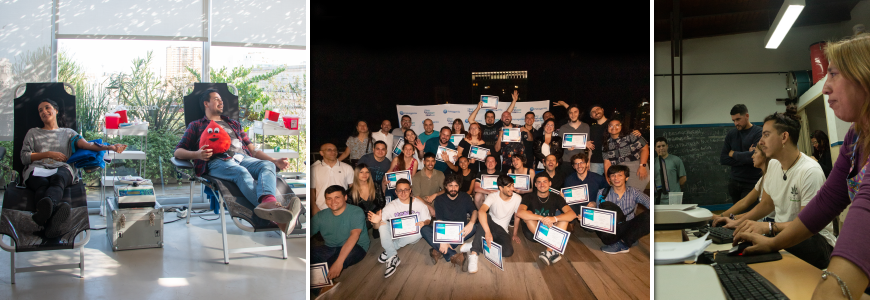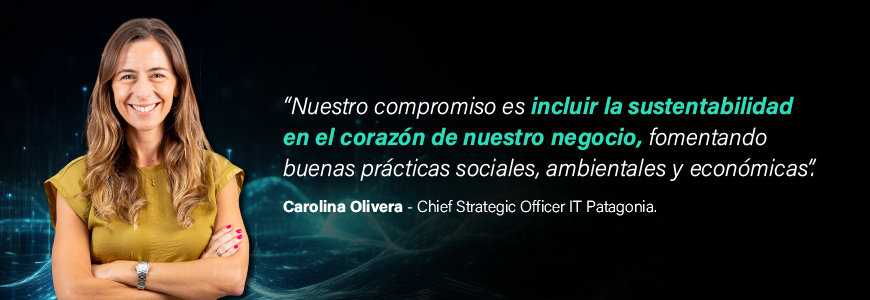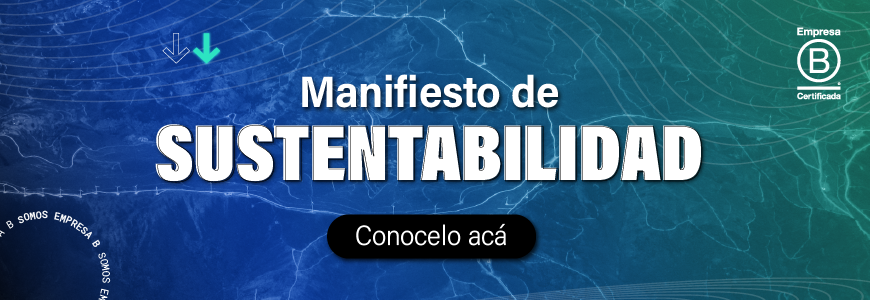What are triple impact companies and how are they positively changing the world?
After decades of economic models focused solely on generating wealth without thinking about the consequences, a new way of doing business is emerging with force, driven by the triple impact companies.
The business world is becoming more complex and challenging, and companies are realizing that they have a key role to play.
In this context, and with the help of entrepreneurs who question their business models and position themselves as agents of change, year after year Many organizations are migrating to models that balance purpose and profit making.
In this article, together with Carolina Olivera, Chief Strategic Officer and sustainability referent at IT Patagonia, we observe what aspects characterize the companies that compete for be better for the world, people and nature, we analyze the challenges and achievements achieved so far by the group of purpose-driven companies, and we retrace the path we traveled in IT Patagonia together with our clients.
What are triple impact companies and what characteristics identify them?
Triple impact companies aim to create a new economy and contribute to the Building a more sustainable and inclusive future.
They differ from traditional models because, in addition to producing the return necessary to meet their business objectives, they use market force to generate positive impacts for business, people and the planet.
Over the past few decades, consumers have changed their purchasing habits. They are becoming more socially responsible and are exercising their power more and more frequently and forcefully.
The increase of the conscious consumers is forcing companies to rethink the way they do business. But to be effective, Sustainability actions have to be true, and not of greenwashing.
“Impact models They must be the heart of the company, what we do every day, but with the added benefit of generating positive change on a large scale,” explains Carolina.

That's why, The main challenge facing the those responsible for organizations is to ask complex questions and sincere about their activity, in order to act accordingly to the responses obtained.
Some examples of questions to ask yourself are: Is my company a company that the world needs? What social and/or environmental problems is my company solving?
“If the answers to these questions are negative, then we can say that we are facing an old economy company. In this scenario, in order not to disappear, it is necessary to create an impact model that is the center of its business solutions, that generate profitability, but at the same time contribute to solving a problem on a social and/or environmental scale", Carolina says.
What are the rationales for organizations that choose this type of business model?
Triple impact companies aim to generate positive impacts on the community and the planet. In other words, benefits of a wide range and different nature.
They are not perfect, but what differentiates them is their work focused on Generate a culture of change and continuous improvement, through a business model linked to sustainability.
“Beyond thinking about the benefits, the important thing is to highlight that there are no impeccable companies, but rather the important thing is to work for generate a change of mindset that allows us to continue producing businesses that enhance this vision of triple impact, from a perspective of continuous improvement,” Carolina exemplifies.
For example, at IT Patagonia we focus on measuring the environmental impact of our services to be able to have that indicator in our carbon footprint measurement. But also to give our clients a deliverable with which they can see how the negative impact on their value chain is reduced by the good digital practices we implement.
This is an example of how the sustainability strategy impacts all aspects of the organization, including business management.

Why is IT Patagonia a triple impact company?
We are a technology services company, part of the IT industry. This is a sector that has been used to living with the technology for several years. Constant need to train specialized talents, a product of growing demand.
But later, with the rise of digital transformation that drove the massive digitalization of services and products, this problem spread to all types of organizations.
At the same time, the socioeconomic reality of our country is very complex and has been hitting the most vulnerable populations hard - mainly young people and women.
Given these scenarios, we decided to be protagonists and work in find a solution that allows the two worlds to unite: a growing industry with demand for talent and the need for create quality jobs for people.
As an organization, we have defined our purpose as contribute to sustainable development through technology and education.
As a means to contribute to this purpose, we created a technology training academy for people over 18 years of age, with a special focus on women. The objective of this program was always associated with creating the talents that the IT industry needs and at the same time, generating quality and sustainable employment as a driver of upward social mobility.
"As Certified B Corporation, throughout this journey we have been working to continue evolving our model, measuring, reporting and adding greater commitment in Generate actions for the benefit of people and the planet”, says Carolina.
In our particular case, we put people at the center of the impact model, through access to training scholarships, with which they can Train in technological skills that are in high demand in the world of work and access quality and sustainable employment, he details.

Triple impact companies: context, challenges and pending issues
In September 2015, the United Nations Member States approved 17 Sustainable Development Goals (SDG). As part of the Agenda 2030These goals seek to stimulate the contribution of governments, the private sector, civil society and individuals to eradicate poverty, protect the planet and ensure prosperity for all.
From that moment on, States, public and private organizations, communities and individuals are compelled to do their part in the implementation of an environmental agenda that establishes impact reduction goals for the decades of 2030 and 2040.
In that context, The legal framework is one of the pending accounts.
Currently, there is no regulation in Argentina at the national level that normalize the activity of triple impact companies, a milestone that other countries in the region have already achieved, such as Peru, Colombia, Ecuador and Uruguay.
The project of Law on Benefit and Collective Interest Societies has been awaiting consideration by the National Congress for several years. The objective of the BIC Law is Legally recognize triple impact companies, to protect and empower them, understanding that this is a key sector for evolving towards a new, more inclusive, sustainable and regenerative economy.
Why is a clear legal framework important? Mainly, because it would give visibility to triple impact companies and would promote the formation of new purpose-driven organizations in our country.
In addition, it would make possible, for example, the creation of a single registry of organizations at the national level, which would allow the creation of sustainable purchasing policies (as works at the provincial level in Mendoza), provide financing opportunities and design tax and other benefits to promote their development.
How is it feasible to do business that preserves the environment and social development?
“There is no such thing as good or bad business, what must exist are Responsible business with people and the planet”.
Under that premise, in IT Patagonia We generate different businesses with impact, based on the training of new talents with technological skills for our clients.
Throughout the process, we enhance the client experience by working alongside senior mentors who empower talent evolution, resulting in significant improvements in job deliverables.
This led us to generate more than 100 jobs in software development positions, with people who had no prior knowledge.
Carolina explains that the greatest achievement of the program is that it allowed them to enter an industry with a high demand for talent and that successfully overcome the employment barriers faced by young people and women.
These milestones encourage us to continue working focused on generating good business but, at the same time, to promote the sustainable development of our country, people and planet.
B Company: how to measure and demonstrate culture
As we said at the beginning, more and more organizations and business leaders are seeking transparency and measuring their social and environmental impacts.
Certification of B Company, delivered by B Lab It is a collective mark of identity within the market. Organizations that obtain it undergo a comprehensive assessment of their sustainability with certification and recertification processes, and make amendments to their legal governance tools.
It is crucial encourage more and more B Companies in the country and the region, as they act as drivers to change the economy through businesses that are more inclusive, equitable and regenerative.
Their impacts can be assessed in terms of the well-being of people, communities and the planet, simultaneously, taking into account both short- and long-term considerations.
IT Patagonia is a B Corporation! We are very proud to contribute to sustainable development through technology and education, and sustainability is at the heart of our business.
Learn how we help organizations Boost your business through technology.

